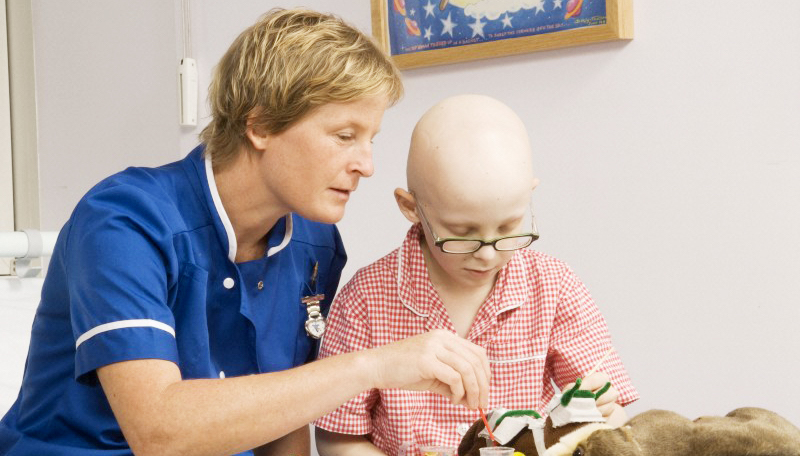
Image: Staff nurse playing with a young boy in hospital. Source: Wellcome Images 2007. License: Creative Commons by-nc-nd 4.0.
In the UK, around 1,700 children aged 15 or under are diagnosed with cancer each year. Partly because of their relative rarity, research and early-stage clinical trials of new treatments in children – and teenagers and young people – are less common than for adults.
However, research taking place here at The Institute of Cancer Research, London is advancing options for children and their families. Together with our partner hospital The Royal Marsden NHS Foundation Trust, we are an internationally leading centre in research and in developing new treatments for childhood cancers.
One of our exciting, pioneering programmes of research is led by Professor Louis Chesler, who leads the Paediatric Solid Tumour Biology and Therapeutics Team in the ICR's Clinical Studies Division, and is an Honorary Consultant Medical Oncologist at The Royal Marsden.
The ICR is an internationally leading research centre in the study of childhood cancers and cancers in children, teenagers and young adults.
Find out more
Genetic testing
Professor Chesler, in collaboration with colleagues across the UK, is leading an ambitious precision medicine programme to match each child diagnosed with cancer in the UK to clinical trials of targeted cancer medicines.
This is guided by individualised genomic testing – testing DNA from cancer samples – which Professor Chesler developed together with Dr Mike Hubank, Joint Head of Clinical Genomics in the NIHR Centre for Molecular Pathology at The Royal Marsden and the ICR.
Thanks to initial funding from the NIHR Biomedical Research Centre at The Royal Marsden and the ICR and UK charity Christopher’s Smile, Professor Chesler and his team are trialling this precision medicine approach in several hundred children with cancer, through innovative clinical trials conducted at The Royal Marsden.
The approach is to use next generation sequencing technologies on blood and tumour tissues to rapidly obtain a genetic profile of the key changes occurring in each patients’ tumour.
A national pilot started in 2016 and approximately 275 children have been tested for molecular changes working with 21 hospitals within the UK Children’s Cancer and Leukaemia Group network.
A much larger national trial of multi-platform genomic testing started in 2018 and will run for three years through the Cancer Research UK Experimental Clinical Medicines Centre Network, funded by Children with Cancer UK, and Cancer Research UK.
Developing innovative clinical trials
As well as developing tests that can guide precise treatment, Professor Chesler works with Dr Lynley Marshall, who leads the Paediatric and Adolescent Oncology Drug Development Team at The Royal Marsden, to trial ICR-developed drugs and drugs first developed for adult cancers in children in innovative clinical trials.
Increasing the number of innovative clinical trials available is a key goal of this team’s ambition to offer children the same opportunities for personalised cancer treatment as are available for adults.
Combined with advanced molecular testing, the use of targeted molecular medicines maximises the chance of successful treatment and avoids the use of more toxic chemotherapies.
The European ITCC-eSMART trial is the first paediatric trial of this type, using a multi-armed ‘basket trial’ approach, with patients assigned to treatment based on molecular testing.
One of the drugs being tested first in children as part of this trial is vistusertib, identified by Professor Chesler’s laboratory as a drug that targets a gene called MYCN, which drives poor outcome in several children’s cancers. The trial is being led in the UK by Dr Marshall.
Supporting our Childhood Cancer appeal will help us develop new treatments for children with aggressive and hard to treat cancers.
Find out more
'Children deserve the very best treatments for cancer'
Professor Chesler is also the UK lead of the USA-EU lorlatinib trial, targeting ALK – another important gene altered in childhood cancer.
“Children deserve the very best treatments for cancer, but for too long there have been delays in applying molecular techniques and biomarker testing to clinical trials, to personalise their treatment and maximise the chance that these drugs can work,” says Professor Chesler.
“We face major barriers in obtaining targeted cancer drugs for children and using them in advanced clinical trials. But I hope that through this initiative, we can drive forward the best possible use of targeted drugs in children and make the case very clearly that they should be more widely available, as they have been for adults.”
Ultimately, we want to empower families by providing the most options, and the greatest access, to developments that can make all the difference.
This article is adapted from a feature which appeared in Advance, our partnership magazine for the Biomedical Research Centre at The Royal Marsden and the ICR.
comments powered by